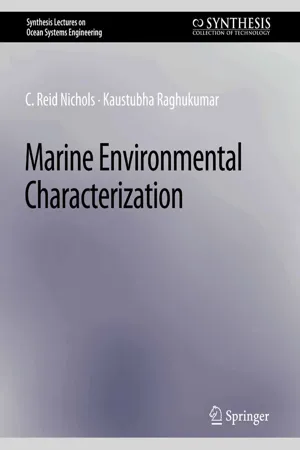
- English
- PDF
- Available on iOS & Android
eBook - PDF
Marine Environmental Characterization
About this book
The use of environmental data to support science, technology, and marine operations has evolved dramatically owing to long-term ocean observatories, unmanned platforms, satellite and coastal remote sensing, data assimilative numerical models, and high-speed communications. Actionable environmental information is regularly produced and communicated from quality-controlled measurements and skillful forecasts. The characterization of complex oceanographic processes is more difficult compared to inland features because of the difficulty in obtaining observations from often remote and hazardous locations. Regardless, coastal and ocean engineering projects and operations require the collection and analysis of meteorological and oceanographic data to fill information gaps and the running of numerical models to characterize regions of interest. Data analytics are also essential to integrate disparate marine data from national archives, in situ sensors, imagery, and numerical models to meet project requirements. Holistic marine environmental characterization is essential for data-driven decision making across the science and engineering lifecycle (e.g., research, production, operations, end-of-life).
Many marine science and technology projects require the employment of an array of instruments and models to characterize spatially and temporally variable processes that may impact operations. Since certain environmental conditions will contribute to structural damage or operational disturbances, they are described using statistical parameters that have been standardized for engineering purposes. The statistical description should describe extreme conditions as well as long- and short-term variability. These data may also be used to verify and validate models and simulations. Environmental characterization covers the region where engineering projects or maritime operations take place. For vessels that operate across a variety of seaways, marine databases and models are essential to describe environmental conditions. Data, which are used for design and operations, must cover a sufficiently long time period to describe seasonal to sub-seasonal variations, multi-year, decadal, multi-decadal, and even climatological factors such as sea level rise, coastal winds, waves, and global ocean temperatures. Combined data types are essential for the computation of environmental loads for the region of interest. Typical factors include winds, waves, currents, and tides. Some regions may require consideration of biofouling, earthquakes, ice, salinity, soil conditions, temperature, tsunami, and visibility. Observations are also used for numerical forecasts, but errors may exist due to inexact physical assumptions and/or inaccurate initial data, which can cause errors to grow to unacceptable levels with increased forecasting times. Overall, marine environmental characterization tools, from observational data to numerical modeling, are critical to today's science, engineering, and marine operational disciplines.
Tools to learn more effectively

Saving Books

Keyword Search

Annotating Text

Listen to it instead
Information
Table of contents
- Cover
- Copyright Page
- Title Page
- Dedication
- Contents
- Preface
- Acknowledgments
- Introduction
- Oceanographic Regions
- Example Critical Phenomena
- Systems and Sensors
- Data Quality
- Data Analysis
- Key Challenges
- Conclusions
- Glossary of Environmental Terminology
- Bibliography
- Authors' Biographies
Frequently asked questions
Yes, you can cancel anytime from the Subscription tab in your account settings on the Perlego website. Your subscription will stay active until the end of your current billing period. Learn how to cancel your subscription
No, books cannot be downloaded as external files, such as PDFs, for use outside of Perlego. However, you can download books within the Perlego app for offline reading on mobile or tablet. Learn how to download books offline
Perlego offers two plans: Essential and Complete
- Essential is ideal for learners and professionals who enjoy exploring a wide range of subjects. Access the Essential Library with 800,000+ trusted titles and best-sellers across business, personal growth, and the humanities. Includes unlimited reading time and Standard Read Aloud voice.
- Complete: Perfect for advanced learners and researchers needing full, unrestricted access. Unlock 1.4M+ books across hundreds of subjects, including academic and specialized titles. The Complete Plan also includes advanced features like Premium Read Aloud and Research Assistant.
We are an online textbook subscription service, where you can get access to an entire online library for less than the price of a single book per month. With over 1 million books across 990+ topics, we’ve got you covered! Learn about our mission
Look out for the read-aloud symbol on your next book to see if you can listen to it. The read-aloud tool reads text aloud for you, highlighting the text as it is being read. You can pause it, speed it up and slow it down. Learn more about Read Aloud
Yes! You can use the Perlego app on both iOS and Android devices to read anytime, anywhere — even offline. Perfect for commutes or when you’re on the go.
Please note we cannot support devices running on iOS 13 and Android 7 or earlier. Learn more about using the app
Please note we cannot support devices running on iOS 13 and Android 7 or earlier. Learn more about using the app
Yes, you can access Marine Environmental Characterization by C. Reid Nichols,Kaustubha Raghukumar in PDF and/or ePUB format, as well as other popular books in Technology & Engineering & Industrial Design. We have over one million books available in our catalogue for you to explore.